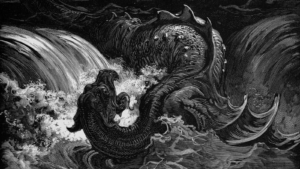When I was growing up, my mother would regularly drive my brother and me to my grandparents’ house—just 15 minutes away—to visit my great-grandmother, who we called medz mayrig (“grandmother” in Armenian), and have a conversation with her in our native language. The sole survivor in her family of the Armenian Genocide, Medz Mayrig had an urgency requiring regular proof and reassurance that despite growing up in a new land, we would be fluent in the Armenian language, history, and culture. No one would succeed in erasing Armenians from this world if she had anything to say about it.
I was raised aware of myself as a member of an ethnic minority whose history was laced with foreign occupation and constant threat of annihilation. In this regard, I always had a strong affinity for the Jewish people, especially of the Hebrew Scriptures. I sympathized with their weeping by the waters of Babylon in exile (Psalm 137), their desire to enter and live in their own promised land and escape Pharaoh’s grip (the book of Exodus), the impulse to build a templeThe Jerusalem temple, unlike the tabernacle, was a permanent structure, although (like the tabernacle) it was a place of worship and religious activity. On one occasion Jesus felt such activity was unacceptable and, as reported in all four Gospels, drove from the temple those engaged... More in the heart of their city, their fight to hold onto their customs and identity that was always at odds with the people and cultures around them.
In short, I sympathized with the scrappy underdog—an innocent victim of goliathThe Philistine giant from Gath, slain by a stone from David's sling. More aggressors, fighting to protect their cultural and religious identity. Faithful to God, willing to live boldly and die boldly for their faith.
Killing for their faith, though—that’s another can of worms.
Enter the story of JezebelQueen who promoted worship of Baal and who opposed Elijah. More (spanning 1 Kings 16 through 2 Kings 9).
I recently returned to this story as I led a Bible study on “bad girls of the Bible,” and I was disturbed by an aspect of the story I had previously overlooked.
To be sure, Jezebel is not a paragon of virtue. This Phoenician queen, married to the Israelite King AhabKing of Israel who opposed Elijah. More (who joins her in Baal worship and abandons the worship of Yahweh), kills the prophets of Israel (1 Kings 18:4) and promotes her own religion. Scripture says that because of this, “Ahab did more to provoke the anger of the Lord, the God of Israel, than had all the kings of Israel who were before him” (1 Kings 16:33). The prophet ElijahA miracle working Israelite prophet who opposed worship of Baal. More, after years of living in hiding from Ahab and Jezebel for fear of his life, emerges at God’s call to confront them with a public contest: gather all the people, prepare a bull offering, and let’s see whose God will answer the prayer to ignite the fire. Of course, the prophets of Baal fail, and Elijah, the remaining lone prophet of Israel, wins, the fire of his bull offering and the power of his God on clear display to the multitudes gathered.
This alone would seem a triumphant end to the story. Jezebel and Ahab, humiliated; the prophet Elijah, victorious; the people of Israel, awakened out of their idolIdolatry is the worship of something other than the true God. An idol may be a cult image, an idea, or an object made of wood or stone. Ome of the Ten Commandments specifically prohibits the worship of graven images or idols; this concern is... More worship and returned to worshiping Yahweh.
But that’s not the end of the story. “Elijah said to them, ‘Seize the prophets of Baal; do not let one of them escape.’ Then they seized them; and Elijah brought them down to the Wadi Kishon, and killed them there” (1 Kings 18:40). An eye for an eye, a prophet for a prophet. Thousands of lives for thousands of lives.
Certainly, it is human to want to smite your enemies. PsalmA psalm is a song of praise. In the Old Testament 150 psalms comprise the psalter, although some of the psalms are laments and thanksgivings. In the New Testament early Christians gathered to sing psalms and hymns and spiritual songs. More 137—the song of Israelites weeping by the waters of Babylon in exile—ends with their imprecatory cry to Babylon: “Happy shall they be who take your little ones and dash them against the rock!” (Psalm 137:9).
But considering that Jezebel’s slaughter of the prophets of Israel was understood to be entirely wicked, is not Elijah’s revenge killing not only excessive, but unholy? One might conclude from the text that God does indeed choose sides, and by definition, designates which people it’s okay or even necessary to kill.
Of course, we know that these scriptures were written from the perspective of the very people trying to make sense of their misfortunes despite their identity as God’s chosen people. Of course, many a preacher and scholar would argue that the point of this story isn’t condoned violence, but God’s faithfulness to God’s people. And of course, Christians have the words of JesusJesus is the Messiah whose life, death, and resurrection are God's saving act for humanity. More, “You have heard it said, an eye for an eye, but I say to you …” We do have that fulfillment of the law in our Savior to counteract the seemingly condoned violence in the Hebrew Scriptures.
I know all this. Still, as an ethnic Armenian (and as someone who tries to read Scripture responsibly and not avoid the hard stuff), for Scripture to ever suggest that God chooses sides, people, and life—and blesses violence done to “the other side”—is deeply problematic.
My Medz Mayrig experienced echoes of this distorted conclusion when Ottoman Turks decided that Armenian Christians living under their occupation were a nationalist threat and systematically exterminated the Armenians and other ethnic minorities in the Ottoman Empire starting in 1915. Jews in Nazi Germany, enslaved Africans and indigenous Americans annihilated under the banner of manifest destiny… the list is too long of genocides against people who other people decided their God was “against.” Today we see similar impulses in the current Russian aggression against Ukraine, or the morally vacuous partisan politics in the United States. All are examples of violent aggression (whether physical or legal) toward a perceived “enemy,” justified by a distorted interpretation of divine will.
As an Armenian, I know this never ends well. Many people, like most of my ancestors, won’t make it out alive. Our faithful reading of Scripture may not allow us to ignore or discard its difficult parts.
It must, however, direct us to the God who created life and called it “very good” (Genesis 1:31). To the God who hates “hands that shed innocent blood, a heart that devises wicked plans, feet that hurry to run to evil” (Proverbs 6:17-18). And to Jesus who came so we “may have life, and have it abundantly” (John 10:10).






